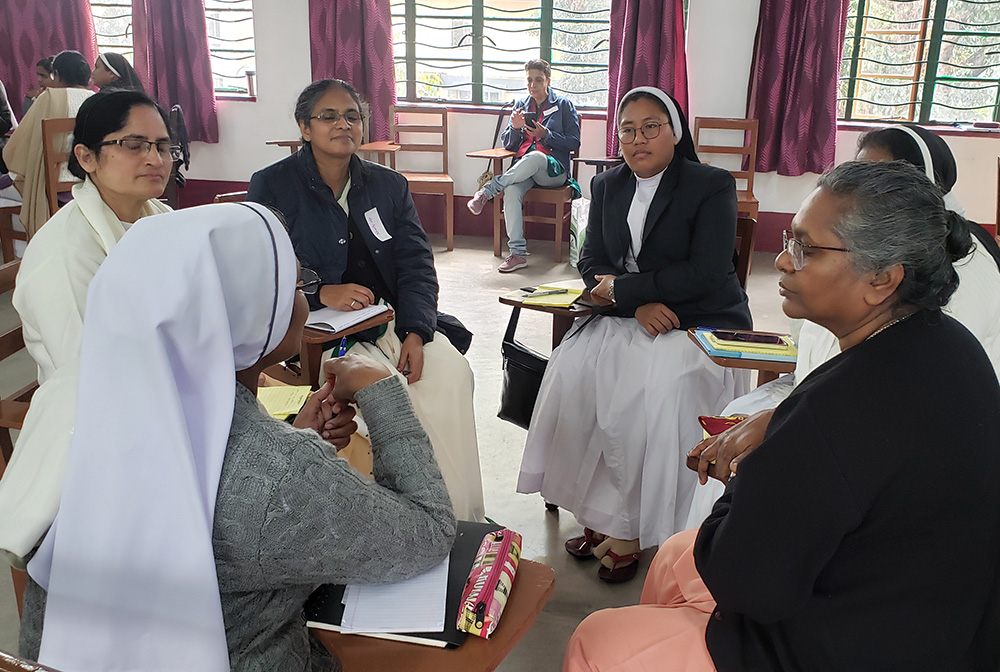
Participants join a group discussion during the Jan. 19-21 training on the Grievance Redressal Cell launched by the Conference of Religious Women India, at the Jesuits' Dhyan Ashram Retreat Centre in the eastern Indian city of Kolkata. (Courtesy of Elsa Muttathu)
Sr. Leena Padam is hopeful that Catholic nuns in India now have a platform for a "proper hearing and legitimate settlement" of their grievances.
"Until now, women religious in India did not know where to air their grievances, but today we have a platform to share our problems without fear of retribution," Padam, a member of the Sisters of Charity of Nazareth, told Global Sisters Report.
Padam was among around 100 nuns who attended a special training on the Grievance Redressal Cell (GRC), an initiative of the Conference of Religious Women India, in the eastern Indian city of Kolkata.
The conference launched the cell on Dec. 10, 2023, through a virtual program for more than 100,000 Catholic religious women in India. It is a place to hear the nuns' grievances, acknowledge them and find a solution through dialogue.
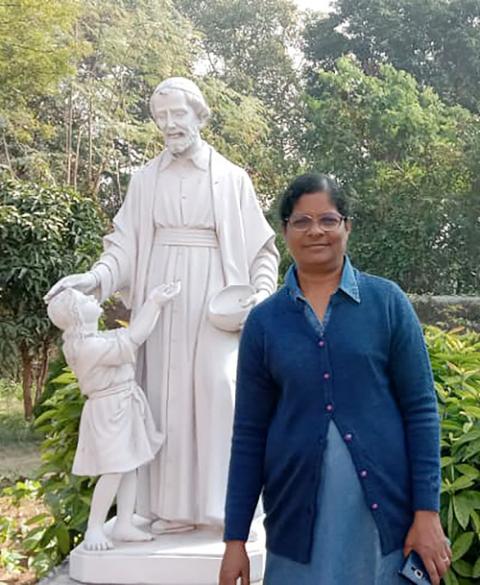
Sr. Leena Padam, a member of the Sisters of Charity of Nazareth (Courtesy of Leena Padam)
"Definitely, it is a ray of hope for nuns, especially the young ones," asserted Padam after the Jan. 19-21 training, the second one to educate nuns about the objective of the cell. Nuns from northern, eastern and northeastern Indian states attended it.
The first training was held Dec. 27-29 in the southern Indian city of Bengaluru for nuns from southern states.
Padam, a social activist based in Ranchi, the capital of the eastern Indian state of Jharkhand, noted, "Generally when a nun complains against a priest or an ecclesiastical authority within the church, she is not trusted. Even her superiors tend to believe what the priest or the bishop says."
Nuns can now approach the grievance redressal, the proper channel, without hesitation. "It is assured that she will be heard, and a solution to her problems will be found if it is possible within the church setup," she said.
Apostolic Carmel Sr. Maria Nirmalini, head of India's more than 130,000 Catholic men and women religious, describes the cell as relevant and timely. "Despite all the systems and care we have in place, some unfortunate circumstances can lead to a feeling of extreme isolation even when one is part of a community and family," she told GSR.
She says the cell is "a way of acknowledging this need and trying our best to provide relief where possible within our community."
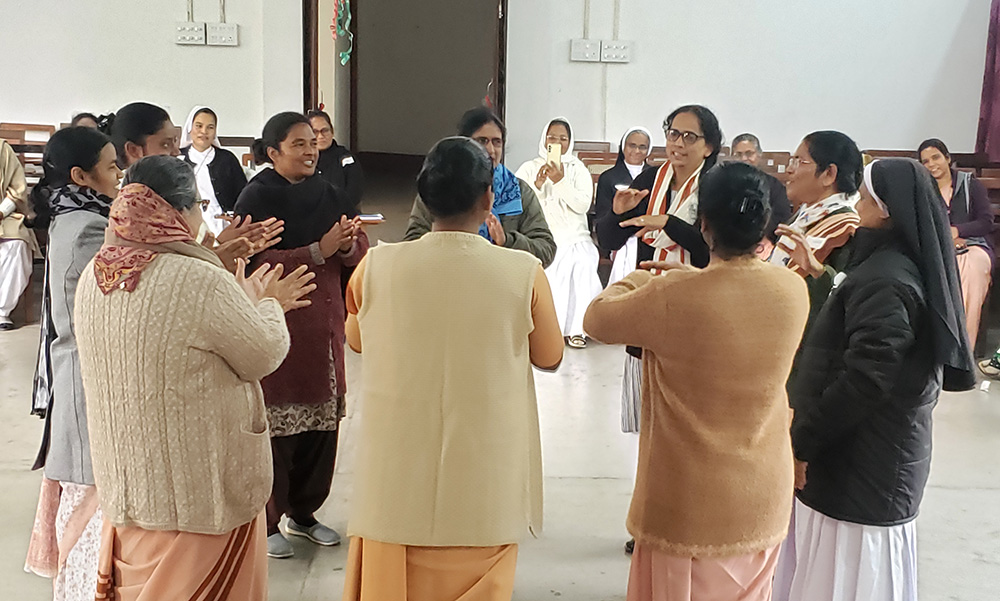
An interactive session takes place during the Jan. 19-21 training on the Grievance Redressal Cell launched by the Conference of Religious Women India, at the Jesuits' Dhyan Ashram Retreat Centre in the eastern Indian city of Kolkata. (Courtesy of Elsa Muttathu)
The impetus to launch the cell was a book on gender discrimination within the church in India, published by the women's section of the conference in 2018.
The book, It's High Time: Women Religious Speak Up on Gender Justice in the Indian Church, found sacramental blackmail, clergy sexual abuse, clericalism and property disputes as some major challenges facing Catholic women religious in the country.
The 86-page book written by a three-member team led by Sr. Hazel D'Lima, former superior general of the Society of the Daughters of the Heart of Mary, also highlighted the "gender injustice" Catholic nuns suffered under the patriarchal church.
Presentation Sr. Elsa Muttathu, national secretary of the Conference of Religious India who leads the trainings, regrets that in many cases, even nuns are not aware of the kind of abuses they suffer from within the system.
"We train nuns to understand different forms of abuse, not only sexual but verbal and other forms, and tell them how to approach the cell," Muttathu told GSR.
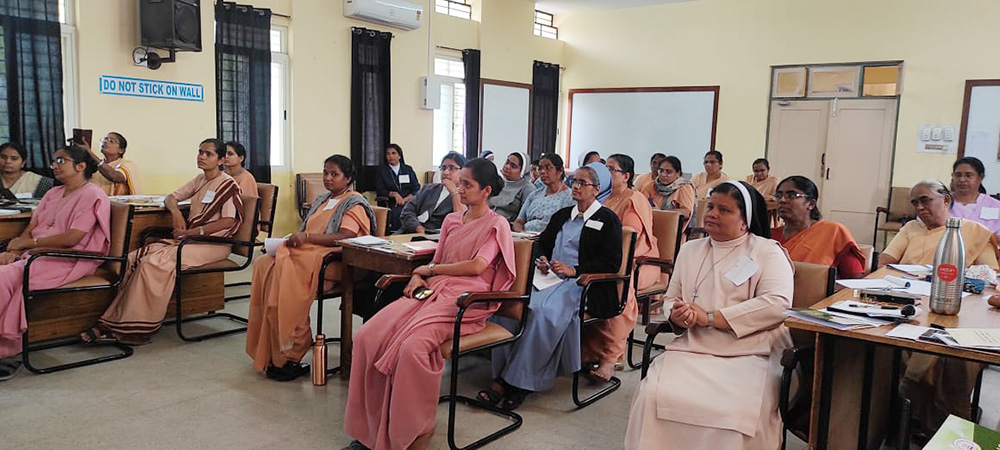
Participants listen during a session of the first Grievance Redressal Cell training, held Dec. 27-29, 2023, at Jesuits' Indian Social Institute in the southern Indian city of Bengaluru. (Courtesy of Nambikai Mary)
She said they have a three-member screening committee that will first study the complaint, and if found true, it will be referred to a nine-member committee.
"The committee consists of five nuns, a religious priest or a brother. The other members are eminent female personalities who are well-versed in the functioning of Catholic religious women," she explained.
Muttathu also said that no major superior is allowed to become a member of this committee, to maintain its neutrality and effective functioning. "In most cases, nuns approach the GRC after they failed to get justice from their congregations," she noted.
"The committee's jurisdiction is within the church framework and will not go for a legal fight in a civil court. However, if the matter needs legal attention, we will support the complainant taking legal recourse but will not be involved directly," Muttathu said.
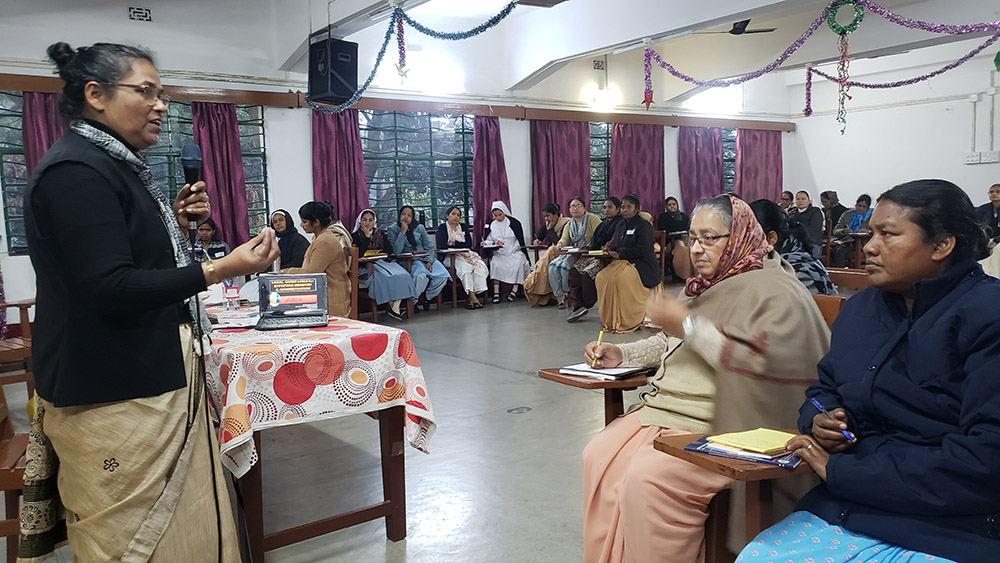
Sr. Mary Scaria, a member of the Sisters of Charity of Jesus and Mary who is a New Delhi-based Supreme Court of India lawyer, addresses participants in the Jan. 19-21 training on the Grievance Redressal Cell launched by the Conference of Religious Women India, at the Jesuits' Dhyan Ashram Retreat Centre in the eastern Indian city of Kolkata. (Courtesy of Elsa Muttathu)
According to the draft guideline drawn by the conference, an aggrieved member can lodge a complaint to the cell either by telephone, in written form or by email. Once the complaint is lodged, it will be acknowledged within seven working days.
The acknowledgment includes a unique grievance number and the mode of tracking its progress.
The Grievance Redressal Cell, however, will not entertain an issue that is before a court or under a police probe.
The guideline promises to resolve a normal complaint within 30 days. A complex and sensitive complainant will take more time, and the cell will inform the complainant about the delay.
Advertisement
If a complainant fails to respond to the cell's written response in 45 days, the matter will be considered as closed.
The cell assures to keep confidential the complainant's identity and the details about the complaint unless required by an external agency to resolve the crisis, that too with prior consent.
The cell will conduct its proceedings like in a civil court — issue notice to the accused, seek written reply, examination of witnesses and do fact-finding, among other actions.
The cell aims to close even a serious case within 90 days to avoid delay in getting justice for the complainant.
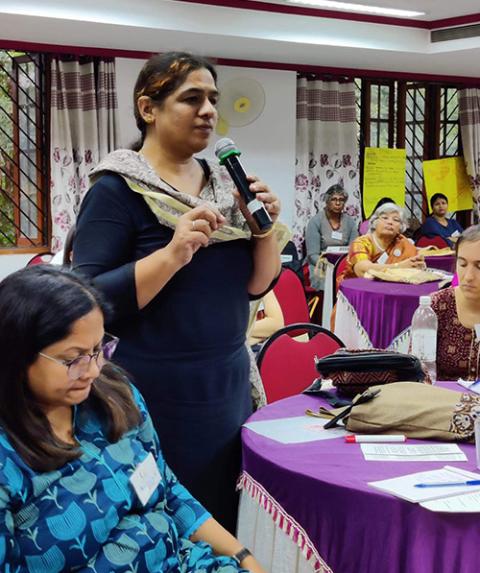
Anita Cheria, a Catholic human rights activist, speaks during the Jan. 19-21 training on the Grievance Redressal Cell in Kolkata, India. (Courtesy of Anita Cheria)
Anita Cheria, a human rights activist based in the southern Indian state of Bengaluru, said the "whole idea of this mechanism is to transform religious life to happiness and worth."
"Within the Catholic church, there are many systems in place, but I still have come across nuns in desperate positions pushed to extreme steps like suicide or leaving the congregation," Cheria, a Catholic laywoman and one of the resource persons for the training, told GSR.
She said in many cases, the complainant was treated as a troublemaker in the congregation and isolated, leaving no room for addressing her issue.
"In some cases, the superiors defend the accused, making the complainant more vulnerable," Cheria said.
Since 1997, more than 20 nuns have reportedly committed suicide in India, most of them in Kerala, a Christian stronghold in the south.
Cheria says a hearing would have helped many to avoid resorting to extreme steps. "The new initiative is a major step forward to address issues confronting nuns within the patriarchal system," she explained.
Sr. Nambikai Mary, secretary of the conference's Tamil Nadu and Pondicherry unit in southern India, says nuns now feel they have a place where they will be heard.
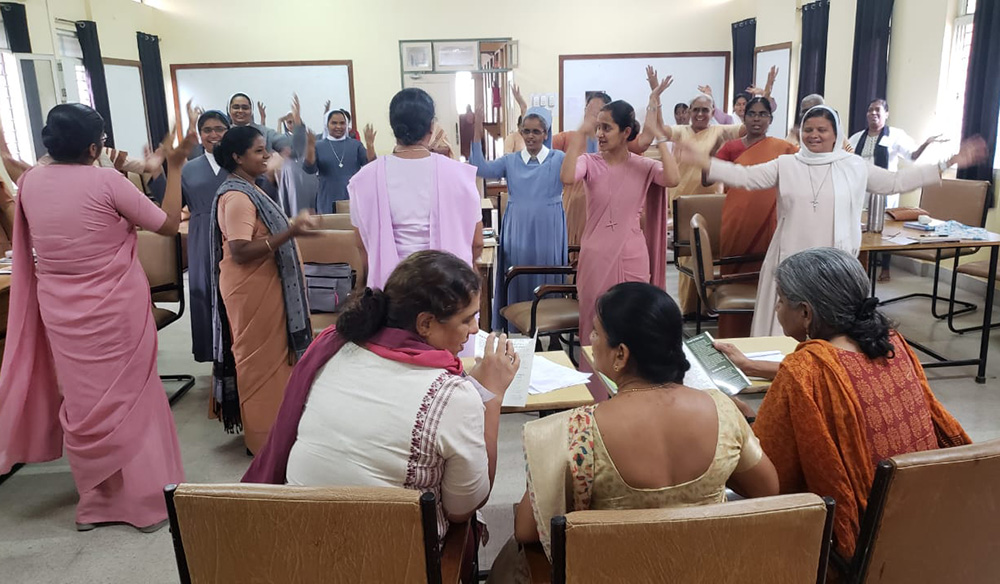
Sisters participate in a session of the first Grievance Redressal Cell training, held Dec. 27-29, 2023, at Jesuits' Indian Social Institute in the southern Indian city of Bengaluru. (Courtesy of Nambikai Mary)
Mary, a member of the order of St. Ann of Providence who attended the training in Bengaluru, told GSR, "Nuns suffer harassment of different nature from within the church setup and outside, but most often they are unable to stand up and oppose them as they lack support from within the congregation or the church."
She says the Grievance Redressal Cell is "not merely a consolation but a source of strength."
Muttathu said the training is not restricted to abuses within the church but also covers important laws such as the Protection of Children from Sexual Offenses Act of 2012, a federal law to protect children from all forms of sexual abuse, and the Prevention of Sexual Harassment at Workplace Act.
The workplace law mandates that every organization define its sexual harassment policies, prevention systems, procedures and service rules for its employees, among other things, the national secretary said.
Cheria congratulates the women's section of the conference for setting up the GRC, but "it is a big challenge to take forward in a patriarchal church set up. Since it is set up within the CRI framework, it has legitimacy, and we are hopeful that slowly, the church authorities will accept this change in India as the Vatican has zero tolerance to abuses of all forms."





